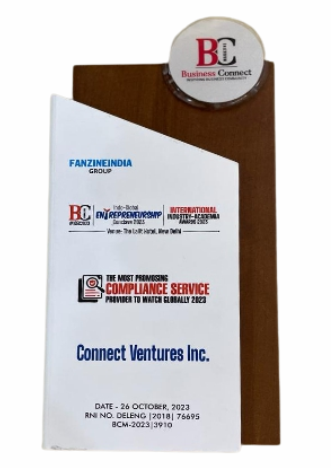Connect Ventures in News
















Our Services
USA COMPANY MATTERS
- Company Incorporation in the US
- Dissolution of a US Company
- Revival of the US Company
- Conversion of US Entity Type
- Domestication of a US Company
US COMPANY RESTRUCTURING
- ESOP by your US Corporation
- Eventual Filings of your US entity
- Spin-off & Divestiture in US
- Mergers and acquisitions in the United States
- Strategic Investments
USA TAXATION
- EIN / ITIN Registration & Return Filing in US
- International Taxation / US Tax Returns
- US Payroll Tax Registration and Filing
- US Sales & Use Tax Registration & Return Filing
- IRS Matters in the United States of America
CROSS BORDER BANKING & MORE
- FEMA (ODI|APR) Indian Compliance
- US CPA letters/ certification
- Non-Resident Business Banking for your US company
- Resident / Nominee Director for US entity
- The US Company’s Accountings & Audit
Why Choose Comply Globally?
Our Commitment to our Brand Promise is the reason to choose us. We promise:
Speed of Action:
We’ll get your business up and running quickly across borders.
Accuracy and Competence:
Trust our expertise for reliable compliance solutions.
Ease of Doing Business:
Navigate international complexities with our simplified approach.
Cost Effective:
We provide efficient compliance services that fit your budget.

"10 Most Promising Startups for Corporate Services Providers 2023"
by Silicon India Magazine.

“The Most Promising Compliance Service Provider to Watch Globally 2023".
by Business Connect Magazine.

Do You Know How to Grow Your Business in the US and Why?
Here we offer you, a complete eBook Guide, Things to Consider Before Launching a Business in the United States by Dr. Anil Gupta, Business Coach (Cross-Border Business Expansion) & Chairman, Connect Ventures Inc.
There are only a few things that are simpler than you think, setting and managing Company in the US is one of them. Expand your business across America, with ease and confidence.
Get the benefits of the Golden Opportunity, that can help you start your business in the US now!
Your Success is Our Success. Your growth and satisfaction are the true measure of our success.
At Comply Globally, we’re not just your service provider but your growth partner.
Uncover the secrets to success in the US market, with 12 priceless insights.
Tactics that will take your US business to the top, revealed.
- Types of Companies you can form in the US as a foreigner (non-US resident).
- Tax Advantages of a USA company for foreigners.
- Unique considerations to think about as foreign entrepreneurs, foreign business owners, and foreign startup founders
- Best state to incorporate your company in the US, most apt for your business and from a taxation stand point.
- Answer your dilemma to create a Subsidiary or a New Company.
- Options to set up a company in the US, if you have an established business outside the US?
- Structuring your business in the US.
- Legal issues you should consider.
And a lot more…


Need help? Start your journey today. Reach out now.
Frequently Asked Questions
I. Business Structure
- Personal liability protection for your assets.
- Avoiding double taxation through pass-through taxation.
- Greater flexibility in management and ownership structure.
- Simpler administration compared to corporations.
- Preferred by investors, making it easier to raise large amounts of capital.
- Offering stock options for employee incentive and retention.
- Business continues even if ownership changes.
- Potential tax benefits may be advantageous for specific situations.
- Personal liability protection for your assets.
- Avoiding double taxation through pass-through taxation.
- Greater flexibility in management and ownership structure.
- Simpler administration compared to corporations.
- Preferred by investors, making it easier to raise large amounts of capital.
- Offering stock options for employee incentive and retention.
- Business continues even if ownership changes.
- Potential tax benefits may be advantageous for specific situations.
- Ownership restricted: Only US citizens and resident aliens can be shareholders.
- Non-residents can still own businesses: LLCs and C-Corps are unrestricted.
- Pass-through taxation: Avoids double taxation.
- Potentially lower tax rates: Compared to individual income tax.
II. State Selection
- Delaware: Makes setting up a business easy and has a well-developed legal system.
- Wyoming, South Dakota: Offer low or no taxes and a streamlined business formation process.
- Alaska, Florida: Have no individual income tax and other benefits.
- Industry
- Size and type of business
- Target market
- Personal preferences
- Delaware: Makes setting up a business easy and has a well-developed legal system.
- Wyoming, South Dakota: Offer low or no taxes and a streamlined business formation process.
- Alaska, Florida: Have no individual income tax and other benefits.
- Industry
- Size and type of business
- Target market
- Personal preferences
Choosing a state for your non-resident US business goes beyond just taxes and regulations. Consider these aspects:
- Taxes: Corporate income tax, individual income tax, sales tax, and other state-specific taxes.
- Regulations: Business formation ease, industry-specific regulations, and labor laws.
- Business Climate: Access to talent, cost of living, infrastructure, and quality of life.
- Additional factors: Target market proximity and personal preferences like business culture.
III. Visa Requirements
- Manage or work for the company in the US: You need a valid work visa.
- Invest and run the business: Explore options like the E-2 Treaty Investor Visa.
- Manage or work for the company in the US: You need a valid work visa.
- Invest and run the business: Explore options like the E-2 Treaty Investor Visa.
Yes, Non-resident business owners and entrepreneurs can manage the company in the US remotely without a visa.
A visa would only be required if you want to manage your US company from within the US.
- E-2 Treaty Investor Visa: Invest in and manage a US business (requires treaty nationality, investment, and active involvement).
- EB-5 Immigrant Investor Visa: Get a green card by investing in a US business that creates jobs (requires significant investment).
- L-1 Intracompany Transfer Visa: Transfer from a foreign company to a related US company in a managerial or executive position (requires existing employment abroad).
- O-1 Extraordinary Ability Visa: For individuals with exceptional talent in specific fields (requires evidence of sustained acclaim).
- EB-1 Multinational Manager/Executive Visa: Transfer from a related foreign company to a US company in a managerial or executive position (requires specific qualifications and company relationship).
IV. Tax Implications
Taxes for non-resident US business owners depend on:
A. Business structure:
LLC & C-Corp: Owners report income/losses on their individual returns, the business itself usually pays no US income tax.
- S-Corp: Ownership is limited to US citizens and residents, not available for non-residents.
B. Income type:
- Effectively Connected Income: Taxed at a flat 30%, may be lower due to tax treaties.
- FDAP Income (passive income): Subject to withholding tax, usually 30%, reduced by tax treaties.
C. Filing requirements:
- Non-resident aliens with US income may need to file a US tax return, even if they owe no tax.
Taxes for non-resident US business owners depend on:
A. Business structure:
LLC & C-Corp: Owners report income/losses on their individual returns, the business itself usually pays no US income tax.
- S-Corp: Ownership is limited to US citizens and residents, not available for non-residents.
B. Income type:
- Effectively Connected Income: Taxed at a flat 30%, may be lower due to tax treaties.
- FDAP Income (passive income): Subject to withholding tax, usually 30%, reduced by tax treaties.
C. Filing requirements:
- Non-resident aliens with US income may need to file a US tax return, even if they owe no tax.
Tax filing for non-resident US business owners depends on:
- Business structure: Owners of LLCs and C-Corps report income/losses individually, potentially triggering federal and state filing.
- Income type: “Effectively Connected Income” is taxed federally (30%) and potentially by some states. “FDAP Income” faces federal withholding tax (30%, reduced by tax treaties) and might require state filing depending on the state and income type.
- Filing requirements: All non-resident aliens with US income, even if subject to withholding tax, may need to file a federal return (Form 1040NR). State filing depends on specific state laws and income type.
Needing an ITIN as a non-resident business owner in the US depends on your tax situation:
- ITIN required: If you need to file a US tax return (e.g., “effectively connected income”, other US income, claiming tax treaty benefits) or claim a tax refund.
- ITIN not required: If you have no US tax filing obligations (e.g., no US income).
Owning a US business alone doesn’t trigger the need for an ITIN.
V. Registration and Compliance
Registering and Maintaining a Non-Resident Owned US Company:
Registration:
- Choose business structure: LLC (pass-through taxation) or C-Corp (double taxation).
- Select a state: Consider taxes, regulations, and business climate.
- Choose a business name: Ensure compliance and availability.
- Appoint a registered agent: Receives legal documents on your behalf.
- File formation documents: Articles of Organization (LLC) or Incorporation (Corp).
- Obtain an EIN: Needed for tax returns and bank accounts.
- Register for state and local taxes: Requirements vary by location.
- Open a US business bank account: Manages your company’s finances.
Additional considerations:
- Licenses and permits: May be required depending on your industry.
- Visa requirements: Consult professionals if managing the company from the US.
Ongoing requirements:
- Annual reports: Maintain good legal standing with the state.
- Tax returns: Federal and state filing may be required.
- Employee taxes: Withhold and pay taxes if you have employees.
- Other filings: Additional reports may be needed depending on your industry.
Registering and Maintaining a Non-Resident Owned US Company:
Registration:
- Choose business structure: LLC (pass-through taxation) or C-Corp (double taxation).
- Select a state: Consider taxes, regulations, and business climate.
- Choose a business name: Ensure compliance and availability.
- Appoint a registered agent: Receives legal documents on your behalf.
- File formation documents: Articles of Organization (LLC) or Incorporation (Corp).
- Obtain an EIN: Needed for tax returns and bank accounts.
- Register for state and local taxes: Requirements vary by location.
- Open a US business bank account: Manages your company’s finances.
Additional considerations:
- Licenses and permits: May be required depending on your industry.
- Visa requirements: Consult professionals if managing the company from the US.
Ongoing requirements:
- Annual reports: Maintain good legal standing with the state.
- Tax returns: Federal and state filing may be required.
- Employee taxes: Withhold and pay taxes if you have employees.
- Other filings: Additional reports may be needed depending on your industry.
All US companies, including those owned by non-residents, need a registered agent in the state of registration.
Reason: The agent acts as the legal contact point, receiving:
- Legal documents: Service of process, court documents, etc.
- Official notices: Government filings, tax documents, etc.
Ensuring compliance: This ensures timely receipt of crucial documents to respond appropriately and maintain legal and tax compliance.
Options for Non-Residents:
- Individual resident: Appoint a trusted person in the state (potential reliability concerns).
- Registered agent service: Professional services offer:
- Guaranteed availability
- Expertise and experience
- Nationwide coverage (if needed)
Conclusion: A reliable registered agent is essential for non-resident business owners, ensuring proper document receipt and facilitating legal and tax compliance.
VI. Banking and Financial Services
Yes, non-resident business owners can generally open a business bank account in the US as non-residents, but there might be additional requirements and challenges compared to resident business owners.
Yes, non-resident business owners can generally open a business bank account in the US as non-residents, but there might be additional requirements and challenges compared to resident business owners.
Managing International Finances for a US Company: Options and Considerations
Challenges: Currency fluctuations, international payments, and local regulations.
Options:
- Traditional Banking: International business accounts and foreign exchange services (potentially higher fees).
- Currency Specialists & Fintech Companies: Competitive rates, customized solutions, and online platforms (potentially better for high volume or complex needs).
- International Payment Processors: Online options like PayPal or specialized processors for specific industries (convenient for smaller transactions).
Choosing the Best Option:
- Transaction frequency & volume: High volume may benefit from specialists.
- Business size & complexity: Larger companies may need specialists.
- Technology adoption: Consider online platforms if preferred.
- Cost considerations: Compare fees, rates, and other costs.
Additional Considerations:
- Compliance: Ensure the chosen method adheres to international regulations.
- Security: Implement measures to protect your financial information and transactions.
VII. Additional Considerations
We as Connect Ventures Inc. can help you set up and manage your US company.
Connect Ventures Inc. is a global compliance management company/ corporate service provider based out of the USA and India with a well-known brand reputation.
Connect Ventures Inc. is the brainchild of India’s premier business coach for cross-border business expansion i.e., Dr. Anil Gupta, you can learn more about him at www.linkedin.com/in/startupmentor.
We have helped entrepreneurs, business owners, and business managers in doing business across borders by providing legal company setup, managing tax and secretarial compliances, and facilitating cross-border collaborations.
We have served more than 1000+ businesses through our services for cross-border expansion, including company incorporation, banking assistance, distributor network, and e-commerce export.
We work with government bodies, private corporations, start-ups, and tier 1 corporates to connect and facilitate foreign businesses with Indian counterparts.
We offer various compliance solutions in key business destinations such as the US, UK, Canada, European Union (27 countries), Australia, UAE, Saudi Arabia, India [FEMA (ODI | FDI | ECB) & Transfer Pricing Only], Nepal, Singapore, Hongkong, Malaysia, Thailand, Indonesia, Vietnam, Egypt, Nigeria, Mauritius, etc.
We as Connect Ventures Inc. can help you set up and manage your US company.
Connect Ventures Inc. is a global compliance management company/ corporate service provider based out of the USA and India with a well-known brand reputation.
Connect Ventures Inc. is the brainchild of India’s premier business coach for cross-border business expansion i.e., Dr. Anil Gupta, you can learn more about him at www.linkedin.com/in/startupmentor.
We have helped entrepreneurs, business owners, and business managers in doing business across borders by providing legal company setup, managing tax and secretarial compliances, and facilitating cross-border collaborations.
We have served more than 1000+ businesses through our services for cross-border expansion, including company incorporation, banking assistance, distributor network, and e-commerce export.
We work with government bodies, private corporations, start-ups, and tier 1 corporates to connect and facilitate foreign businesses with Indian counterparts.
We offer various compliance solutions in key business destinations such as the US, UK, Canada, European Union (27 countries), Australia, UAE, Saudi Arabia, India [FEMA (ODI | FDI | ECB) & Transfer Pricing Only], Nepal, Singapore, Hongkong, Malaysia, Thailand, Indonesia, Vietnam, Egypt, Nigeria, Mauritius, etc.
US Business: Cultural & Legal Considerations
Culture:
- Individualism & achievement: Individual initiative and responsibility are valued.
- Direct communication: Straightforward and to the point.
- Informal work environment: Less emphasis on formality compared to some cultures.
- Time management: Punctuality and meeting deadlines are crucial.
- Negotiation style: Assertive and competitive, focused on the best outcome.
Law:
- Contracts: Highly valued and legally binding. Clear written contracts are essential.
- Intellectual property (IP): Strong protection for patents, copyrights, and trademarks.
- Employment law: Complex laws governing minimum wage, overtime, discrimination, and workplace safety.
- Consumer protection laws: Businesses must comply with regulations designed to protect consumers.
- Diversity and inclusion: Businesses are expected to be inclusive and welcoming to diverse backgrounds.
- Compliance with regulations: Adherence to federal, state, and local regulations is crucial to avoid legal issues.
Understanding these cultural and legal considerations is essential for successful business operations in the US, especially for those unfamiliar with the American business landscape.
Running a US company as a non-resident comes with potential risks and challenges:
- Complex legal & regulatory environment: Requires understanding and complying with US laws, which can be challenging for non-residents.
- Tax implications: Double taxation and complex filing requirements can arise depending on the business structure and tax treaties.
- Operational challenges: Managing from afar due to time zone differences, limited physical presence, and finding reliable partners can be difficult.
- Increased costs: Fees for professional services like lawyers and accountants, and potentially higher costs for opening a US bank account.
- Visa considerations: Non-residents might need specific visas to work in the US.
Mitigating these risks:
- Consult with professionals: Seek guidance from lawyers, accountants, and immigration advisors specializing in US business and non-resident ownership.
- Plan and research thoroughly: Understand legal, tax, and regulatory requirements, and the US business environment.
- Leverage technology: Utilize online tools to bridge the physical distance and facilitate collaboration.
Carefully plan, manage, and seek professional guidance to overcome these challenges and run a successful US company as a non-resident.
Connect Ventures Inc. A1503, Apex Acacia Valley, Sector 3, Vaishali, Ghaziabad, UP, INDIA 201010
© 2024 Connect Ventures Inc. All Rights Reserved

